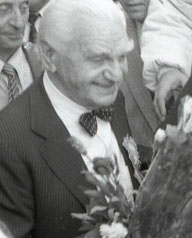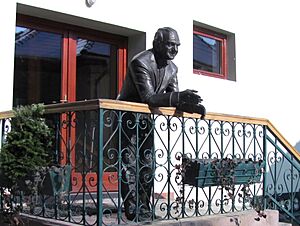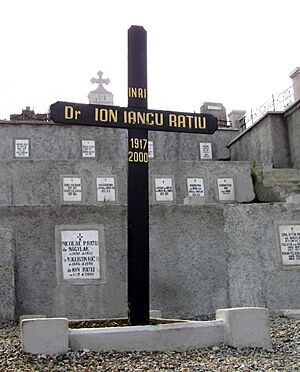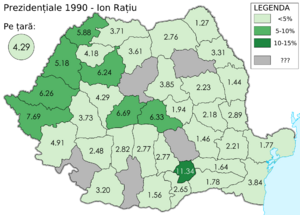Ion Rațiu facts for kids
Quick facts for kids
Ion Rațiu
|
|
|---|---|

Rațiu in the early 1990s
|
|
| Member of the Chamber of Deputies of Romania | |
| In office 1990–2000 |
|
| Personal details | |
| Born |
Ion Augustin Nicolae Rațiu
6 June 1917 Torda, Austria-Hungary (now Turda, Cluj County, Romania) |
| Died | 17 January 2000 (aged 82) London, United Kingdom |
| Resting place | Central Cemetery of Turda |
| Nationality | Romanian |
| Political party | National Peasants' Party (PNȚ) Christian Democratic National Peasants' Party (PNȚCD) |
| Spouse | Elisabeth-Blanche Pilkington |
| Children | Indrei-Stephen Nicolae-Christopher |
| Parents |
|
| Relatives | Mircea Rațiu (brother) Indrei Rațiu (son) Nicolae Rațiu (son) Tudor Rațiu (nephew) |
| Residences | London, Turda, and Bucharest |
| Alma mater | St John's College, University of Cambridge (UK) Babeș-Bolyai University (RO) |
| Occupation | Businessman, lawyer, diplomat]], journalist, writer, and politician |
| Known for | Re-founding the historical PNȚ as PNȚCD and contributing to the reinstating of democracy in Romania after 1989 |
Ion Rațiu (born June 6, 1917 – died January 17, 2000) was a famous Romanian lawyer, diplomat, journalist, businessman, writer, and politician. He was known for his strong belief in democracy. Many people in Romania remember him as a very important politician from the 1990s.
He ran for president of Romania in 1990 for the Christian Democratic National Peasants' Party (PNȚCD). He came in third place in that election. Even though he didn't win, he is still admired by many Romanian politicians today. Some even say they voted for him back in 1990. This includes the current President of Romania, Klaus Iohannis.
During his time living outside Romania, Rațiu met with important leaders from Western countries. These included former British Prime Minister Margaret Thatcher and former American President Jimmy Carter. He also met with American Senator Bob Dole.
Contents
Ion Rațiu's Life Story
Early Life and Education
Ion Rațiu was born in Turda, which was part of Austria-Hungary at the time. Today, Turda is in Romania. His father was Dr. Augustin Rațiu. Ion Rațiu was also related to Dr. Ioan Rațiu, who was a leader of the Transylvanian Memorandum. His grandmother, Eugenia Turcu, was the daughter of a Romanian activist and journalist.
He went to school in Turda and then to high school in Cluj. In 1938, he earned a law degree from King Ferdinand I University in Cluj.
In 1940, Rațiu became a diplomat for Romania in London. When the king of Romania left the country later that year, Rațiu resigned from his job. He asked to stay in the United Kingdom as a refugee. In 1943, he earned another degree in economics from the University of Cambridge. In 1945, Rațiu married Elisabeth Pilkington. They had two sons, Indrei and Nicolae.
Life Outside Romania After World War II
Rațiu stayed in London after the Communist Party took control in Romania in 1947. From the start of World War II, he worked against governments that controlled everything. He helped create a group called the Central European Student and Youth Society.
In 1961, he started publishing a weekly news bulletin called the Free Romanian Press. He also wrote regularly for the BBC Romanian service, Radio Free Europe, and Voice of America. In 1957, Rațiu published a book called 'Policy for the West'. This book shared his thoughts on how Western countries viewed the Soviet Union and communism.
In 1975, he published another book, Contemporary Romania. After this, he decided to spend all his time working to help Romania become a free country. He played a big part in setting up the World Union of Free Romanians. He was chosen as its president in 1984. Soon after, he started publishing The Free Romanian/Românul liber, a newspaper in both English and Romanian.
Political Work in Romania After 1989
Ion Rațiu returned to Romania in January 1990. He helped bring back the National Peasants' Party. He became its vice-president. Soon after, he ran for president in the 1990 election but did not win. However, he was elected as a representative for Cluj County in the Romanian Parliament in 1990 and 1992. He was then elected for Arad in 1996.
He also served as the vice-leader of the Parliament. He was an ambassador who helped Romania join NATO. In 1991, he restarted the newspaper Cotidianul.
In a TV debate in 1990, Rațiu famously said something important about democracy: "I will fight until my last drop of blood so you have the right not to agree with me!" This means he believed strongly in everyone's right to have their own opinion, even if it was different from his.
Ion Rațiu passed away in London on January 17, 2000, after a short illness. He was surrounded by his family. As he wished, he was buried in his hometown of Turda, in Transylvania.
Election Results
Presidential Elections
| Election | Party | First Round | Second Round | ||||
|---|---|---|---|---|---|---|---|
| Votes | Percentage | Position | Votes | Percentage | Position | ||
| 1990 | PNȚCD | 617,007 |
4.29%
|
3rd | |||
 | John T. Biggers |
 | Thomas Blackshear |
 | Mark Bradford |
 | Beverly Buchanan |




